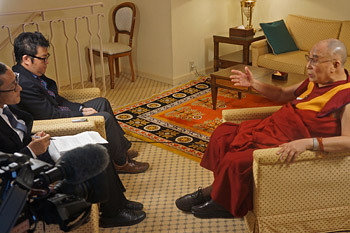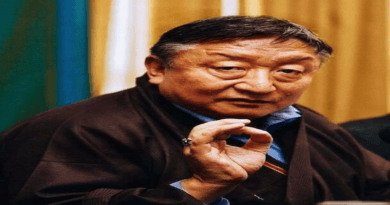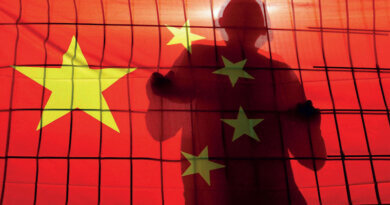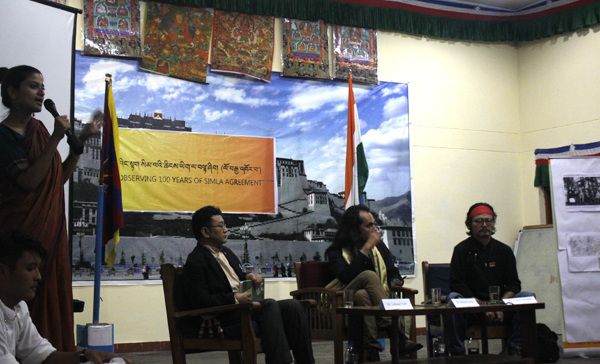His Holiness appears for interview on Japan’s NHK TV
By Lobsang Tenchoe
DHARAMSALA May 10: The Tibetan spiritual leader His Holiness the Dalai Lama, who is currently on a five-day visit to Japan from May 9 – 13, after arriving in Osaka appeared for an interview yesterday on NHK, Japan’s national public broadcasting organization.
His Holiness the Dalai Lama met with NHK correspondents, Mr Makato Oda and Mr Eisuke Takahashi for an exclusive interview which lasted for about two hours, a report on the Tibetan Nobel Peace laureate’s official website dalailama.com stated.
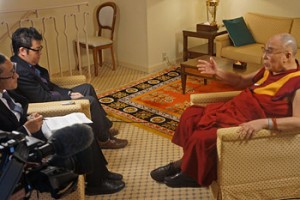
The interview began with the correspondents asking about the real situation inside Tibet for which His Holiness promptly suggested them that they better send Japanese journalists to visit the towns, villages and nomad encampments in Tibet to find out first hand information. When asked about his reincarnation, His Holiness told the correspondents that the continuity of the Dalai Lama institution depends entirely on the Tibetan people “As far back as 1969, I have stated that it is up to the Tibetan people to decide whether the institution of Dalai Lama should remain or not. However, these days the Chinese government seem more interested in the issue than myself,” His Holiness laughed.
“I find it baffling because the Chinese government’s interest in the issue is solely political, not religious. During the Manchu dynasty, Chinese involvement in the issue is understandable because of religious connection emanating from the priest-patron relationship. However, modern Communist China calls itself atheist. So, they have no business in the issue. That’s why I often joke that the Chinese government should first announce the reincarnation of Mao Zedong and others if they really believe in reincarnation,” His Holiness added.
His Holiness further explained that sustenance of the Tibetan Buddhist culture is not dependent on one person and cited example of Lord Buddha and other ancient Indian masters whose teachings have flourished even without the institution of reincarnation.
His Holiness concluded that continued study and in-depth analysis of the Buddhist scripts is the core essence, which can guarantee effective sustenance.
Asked about non-violence, His Holiness replied: “As long as I am alive, I am committed to non-violence. It is only through non-violence that we can create a positive impact”.
His Holiness maintained and urged world leaders to extend more support to non-violent movements.
“It would send a wrong message if world leaders continue to back violent movements without paying concrete support to non-violent movements such as the Tibetan struggle. Non-violent movements need to succeed to set precedence for others”.
His Holiness further emphasized that education is the key to developing a happier world but lamented the current education system as inadequate when it comes to guaranteeing inner peace and called for a more holistic education system, which includes developing inner values among children to develop a compassionate mindset from childhood.
Speaking about the middle way approach, His Holiness described it as the only realistic solution when it comes to resolving the Tibet issue in a mutually beneficial way.
“I really admire the concepts of federations such as the European Union where countries are foregoing their sovereign rights to join the union. In today’s interdependent world, countries cannot live in isolation without depending on others. As for Tibet, we have a huge land and a rich culture but we need China’s help to develop economically,” His Holiness said.
Applauding the reconciliatory spirit of the Japanese and the German people, His Holiness said, “Even though two atomic bombs were dropped in Japan, most Japanese have reconciled from the past and doesn’t carry sentiments of vengeance anymore. The same goes for the Germans. Similarly, Tibetans should be realistic and preserve its rich cultural traditions through genuine autonomy” and declared that that ‘common interest should be more important than independence at this crucial juncture in our country’s history.
Today, His Holiness began his four-day teaching of Shantideva’s ‘Guide to the Bodhisattva’s Way of Life’, to an audience of 2700 devotees at the Osaka International Convention Center in Osaka, Japan’s second largest city.

